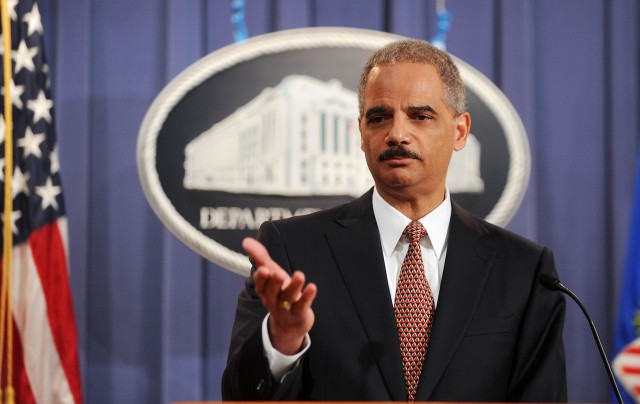
MIAMI — Confessed 9-11 mastermind Khalid Sheik Mohammed and
his four co-accused will face a federal trial in New York City — not a military
tribunal at Guantanamo, Attorney General Eric Holder announced Friday.
Charges against the alleged al-Qaida kingpin have not yet
been filed in the Manhattan court.
But President Barack Obama’s administration has decided to
abandon a Pentagon prosecution and pursue the case of the mass murder case of
nearly 3,000 people on Sept. 11, 2001 in a civilian setting.
“They will be brought to New York — to New York — to
answer to their alleged crimes in a courtroom just blocks away from where the
Twin Towers once stood,” Holder said.
He added that he would ask prosecutors, jointly working on
the case from New York City and Virginia, to seek the death penalty for all
five men. “These were extraordinary crimes so we will seek extraordinary
penalties,” he said.
Military charges seeking the death penalty in the complex
conspiracy case against Mohammed, his nephew and three other men will now be
withdrawn.
The announcement is a key step in Obama’s commitment to
close the prison camps at Guantanamo. President George W. Bush ordered the 9-11
accused and other high-value detainees moved to Cuba from secret CIA custody in
2006 to go before his administration’s special tribunals.
Obama — in Tokyo on a wide-ranging trip to Asia — did not
confirm the details of Holder’s announcement but suggested his administration’s
plan would stand up to international scrutiny.
“I am absolutely convinced that Khalid Sheik Mohammed
will be subjected to the most exacting demands of justice,” Obama said at
a joint news conference in Tokyo with Japanese Prime Minister Yukio Hatoyama.
Obama wants accused terrorists to face trial in traditional
federal courts and to reserve military commission trials for other cases. His
administration earlier this year moved a Tanzanian detainee — accused as a
co-conspirator in al-Qaida’s 1998 U.S. Embassies bombings in East Africa — to
Manhattan for trial.
There were no immediate plans to move the five former
CIA-held captives to Manhattan. Under a law that expires in September, the
administration must notify Congress 45 days in advance of a Guantanamo transfer
to U.S. soil for trial.
Republican critics in Congress slammed the developments as
“irresponsible.”
House Republican Leader John Boehner, R-Ohio, said a federal
trial left open “the possibility” that the Sept. 11 accused
“could be found ‘not guilty’ due to some legal technicality just blocks
from Ground Zero should give every American pause.”
Military commissions created by the Bush administration, he
said, “were specifically designed to prosecute such heinous acts.”
“This decision is further evidence that the White House
is reverting to a dangerous pre-9-11 mentality — treating terrorism as a law
enforcement issue and hoping for the best,” Boehner added.
Holder also announced that Justice Department attorneys had
decided to continue with the prosecutions of five other Guantanamo captives at
a military commission, notably the murder trial of Canadian Omar Khadr.
It was unclear where the military commission trials would be
held but Defense Department sources have told The Miami Herald that the U.S.
Navy managed brig in Charleston, S.C., is a continued site of interest.
{::PAGEBREAK::}
Obama has ordered his administration to empty and close the
controversial prison camps in southeast Cuba by Jan. 22, a deadline that senior
Cabinet members have said will likely slip.
There were 215 detainees at Guantanamo on Friday — 10 of
them in military commission proceedings. Afghan Mohammed Kamin, a long-held
captive accused of aiding al-Qaida, has a pre-trial hearing on Wednesday.
Holder also decided to permit the chief Pentagon prosecutor
to pursue a military commission case against alleged USS Cole bombing
conspirator Abd al-Rahim al-Nashiri, a Yemeni.
The CIA has confirmed that it subjected al-Nashiri, like
Mohammed, to waterboarding in secret black site interrogation, a technique the
Obama administration has defined as “torture,” which could complicate
efforts to present evidence at either trial.
In all, 17 U.S. sailors were killed in the Cole bombing off
Aden harbor in October 2000. Thirty-nine others were injured. The badly damaged
Cole was brought back to the United States, restored and is now based in
Norfolk, Va.
Mohammed and his co-accused have repeatedly boasted of their
roles in the Sept. 11 attacks, in which 19 men hijacked four commercial
airliners and slammed them into the Pentagon, World Trade Center and a
Pennsylvania field. Unclear is whether their comments and letters to a military
judge at Guantanamo would be considered evidence at a federal trial.
The American Civil Liberties Union — a leading critic of
military commissions — hailed the decision to move the 9-11 case to New York
but decried the Obama administration’s decision to retain war crimes trials in
other cases.
“It’s disappointing that the administration has chosen
to prosecute some Guantanamo detainees in the unsalvageable military
commissions system,” said ACLU Executive Director Anthony D. Romero.
But, he said, the decision to hold the Sept. 11 trial in
federal court was “a huge victory for restoring due process and the rule
of law, as well as repairing America’s international standing, an essential
part of ensuring our national security.”
In response to a reporter’s question, Holder defended the
decision to split the Guantanamo cases between civilian and military venues.
He said the 9-11 accused would face civilian trial in New
York because “it is a fundamental tenet” in U.S. law that accused be
tried “where the crimes took place.”
Those facing military trials are accused of war crimes
overseas, mostly in Afghanistan but also in the Persian Gulf.
Via McClatchy-Tribune News Service.














